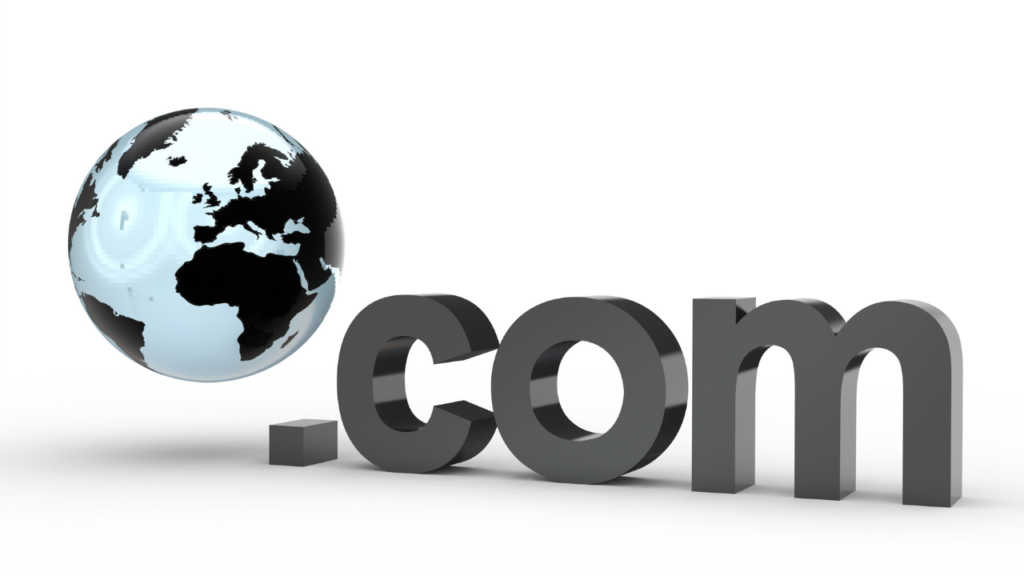
Choosing the right domain name for your website is a crucial step to kick-start your online venture successfully! Search engine optimization, visibility, and brand image are all at stake from the moment you reserve that name.
You can always transfer a domain name to a new online identity. However, it’s still advisable to start off on the right foot by selecting a relevant name when designing your website.
Through nine pieces of advice and tools, discover the ideal name for your website, pick the best domain extension, and register your new domain name.
Choosing the right domain extension
A web address is the combination of a domain name, which is a set of words representing your online brand (e.g., mywebsite), and an extension (e.g., .com, .fr, or .org). The combination of these two elements forms the URL of your site. The extension reflects the type of website, its geographical location, and/or its commercial or non-commercial purpose.
Among the thousands of domain extensions available on the web, the most common ones are .org, .com, and .net, as well as geographical extensions like .fr and .eu.
To choose the right domain extension, it’s essential to understand their advantages and disadvantages.
Pros and cons of .com, .net, and .org extensions
Currently, over 50% of websites worldwide use the .com extension. This extension is a generic top-level domain (gTLD), which means it has no geographical restrictions.
Initially created for international e-commerce sites, this extension is now used by all types of websites. Non-profit organizations and NGOs also have their own domain extension: .org.
The .net extension is the third most popular and serves as an alternative to .com. Abbreviated from “network,” it was originally intended for internet service providers and hosts like OVHcloud.
Please note that mobile browser interfaces do not favor websites with a .net domain. Most mobile phones directly offer the .com extension on their numeric keyboard. Smartphone users might end up on a competitor’s site if you opt for .net.
National, local, and specific extensions

Creating a .fr or .eu domain name is reserved for residents of the European Union. The .fr extension ensures that French-speaking internet users can access relevant content, even when it exists in multiple languages.
ICANN, the authority that regulates domain names worldwide, has authorized the creation of nearly 1,300 specific extensions since 2012. Some of them indicate a location, like .paris and .alsace. Others specify the website’s theme, such as .voyage and .sport.
For certain cases, these extensions are cheaper than .com and .net, allowing you to highlight a brand’s specificity.
Choosing an easy-to-remember domain name
Website addresses have a significant impact on a brand’s image and visibility. Internet users rarely use their bookmarks. They often type the desired site’s name from memory into their search bar.
Your online identity is built around your website. Therefore, it’s best to choose your name with as much care as registering a traditional trademark with INPI.
further read: How to protect your brand, defend it and monitor it?
Choosing a domain name that is easy to pronounce and spell
A memorable domain name is more frequently searched by internet users than a complicated or hard-to-spell one. This is why many companies use their own brand name as their domain name. Some even purchase multiple similar domain names with different spellings or extensions to prevent others from misusing them.
You can redirect several domain names to your main site to guide users, even when they type the wrong extension.
A useful tip: you can host multiple websites on a web hosting package, even if all your domain names are not registered with OVHcloud.
Opting for a short domain name
The shorter a domain name, the easier it is to remember. Internet users will easily find you if your name contains fewer than 12 characters, without numbers or hyphens.
Why 12 characters? Because beyond that, which is roughly three syllables, the website name becomes less straightforward to spell. It will also be quicker to type on a smartphone or tablet, even with a small keyboard.
The maximum length for a domain name is 63 characters, which is a complete sentence. Some special characters are accepted by extensions like .fr. However, we recommend against it because:
- Internet users are not used to special characters and will search for the site without special characters.
- Using special characters in the domain name causes issues with URL encoding.
- Your graphic communication will be less effective, especially when printing on paper or creating visuals for social media.
Your website’s name should be more than just a combination of words; it should be an acronym, a brand that stands out in its domain.
So, getting straight to the point is an effective way to be memorable.
Choosing a domain name that suits your brand image
Your domain name should reflect your site’s concept, your brand, or the theme of your articles. Ideally, it should create an attachment to your company or the products you sell, if you have an e-commerce site.
In the case of e-commerce, semantic value makes sense. For example, eBay represents a unique way of shopping through a search bar. In a time when online sales were mainly categorized with a fledgling filtering system, this type of name was particularly distinctive. As for Cdiscount, the site emphasizes its low prices with a brand name that is easy to remember.
Checking the domain name’s availability
Before purchasing a domain name, it’s essential to verify its availability. OVHcloud offers a domain name verification service. Its dedicated page displays the availability results for different extensions, from the most common to the most specific. This allows you to quickly identify which site names are available and at what price.
Check the availability of my domain name
In some cases, the desired domain name is already owned but available for sale. On the OVHcloud website, it will appear in the results with the label “secondary market.” You can purchase it at the price set by the site owner.
Checking the available domain name’s history
Just because a domain name is free or available doesn’t mean it has never been used to create a website. Its renewal is not automatic, and its right to use is limited for a period of one to ten years, depending on the contracts. Once the domain reaches its expiration date, the site owner is offered a renewal. However, some domain names are abandoned when activities cease, or renewals are forgotten.
Many unrenewed domain names are regularly available for purchase from the registries.
These websites have a history that can be beneficial. Sometimes, they are the subject of redirections (links and anchors) from other web pages, which generates traffic. Before purchasing an expired domain name, check if it has a quality history or, on the contrary, has been blacklisted by Google or other search engines.
Registering your domain name
If you want to use a domain name, you can reserve it through registrars, which are often managed by web hosts like OVHcloud. They are accredited by official organizations. Some of these organizations include Afnic for .fr websites, EURid for .eu domain names, and ICANN for .com, .net, and .org.
Registering a domain name often goes hand in hand with choosing web hosting and, possibly, a content management system (CMS). The CMS facilitates the creation of the website associated with the domain.
Register my domain name
Communicate with your new domain name The notoriety of your future website partially depends on your communication! To promote your new domain name, update your email address and its signature. A messaging domain is easily obtained from a web host.
Simply remember to set up email forwarding from the old address to avoid missing any incoming messages.





